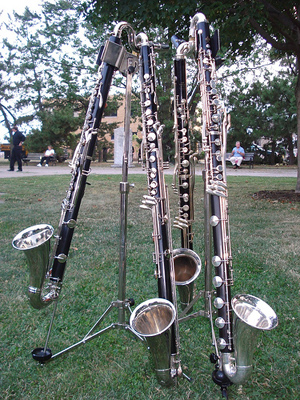 I was corresponding with someone recently about the Impostor Syndrome, the feeling some people have that their successes are due to luck or oversight and that they’re likely to be identified as a fraud and cast out at any moment.
I was corresponding with someone recently about the Impostor Syndrome, the feeling some people have that their successes are due to luck or oversight and that they’re likely to be identified as a fraud and cast out at any moment.
It’s not unusual even for those of us who don’t have a regular problem with Impostor Syndrome to have those feelings from time to time. When I was in high school, I auditioned on bass clarinet for the All New England Music Festival, an event that accepts only the most skilled and able high school musicians. My rehearsals with my accompanyist leading up to the audition were terrible: I wasn’t practicing consistently, and the audition piece was naturally very difficult. I practiced very hard for the last couple of days, but the chance of avoiding extreme embarrassment seemed low. I obsessed about the audition, showed up at the appointed time, went in … and nailed it. I played the piece magnificently. My accompanyist looked at me as though I had grown antennae. I got the highest score of any bass clarinetist who auditioned (admittedly, not as difficult as being the best flutist or trumpet player, but not easy either) and had my pick of positions at the event.
Of course, I felt like a complete impostor. When I arrived at New Englands, I more or less held my own, but I wasn’t as good as the other bass clarinetists there and clearly hadn’t practiced as much, either. For years I regarded that audition as a fluke. It wasn’t until very recently I understood what had really happened.
The key realization was that usually when you’re credited with doing something, it’s because you actually did it. At the audition where I got the great score for my playing, I actually played that well. That was not a fluke in the sense that it is impossible to accidentally play a complicated piece on the bass clarinet well. What probably happened was that I immersed myself so much in desperate practice those last few days that I got into a flow state regarding my playing and was able to play at the very peak of my ability–whereas those who had been practicing all along wouldn’t have needed to obsess over the last couple of days. About 16 years later, I attended the New England Folk Festival (NEFFA) in Natick, Massachusetts and did barely anything but play music for two days. By the second day, I was playing far better than I thought I possibly could, because again I had reached that flow state.
So the fact that I happened to be in that flow state at the time of the audition was a bit of a fluke: I hadn’t been trying for it or even known it existed. But the fact that I was capable of that flow state was no fluke at all. I had, after all, been practicing for years, and had enough love of music to put my heart into it sometimes. Was there luck involved? Yes. In an entirely just world (which of course we don’t live in), would I have been the top-ranked bass clarinetists at New Englands that year? Heck no. But could I under the right circumstances actually play that well? Yes. The things we accomplish rarely fall into our laps.
That’s the irony of Impostor Syndrome, actually: fear of being found out sometimes drives people to work much harder to “cover” for their “shortcomings,” which means they get better and better at the things they think they’re being overappreciated at. As Geoff Colvin and others explain very well, the people who do really well at things are the ones who practice the most.
The question becomes not one of how much we deserve for what we’ve done so far, but instead how we can repeat and build on our best successes in the past.
Photo by MissTessmacher


